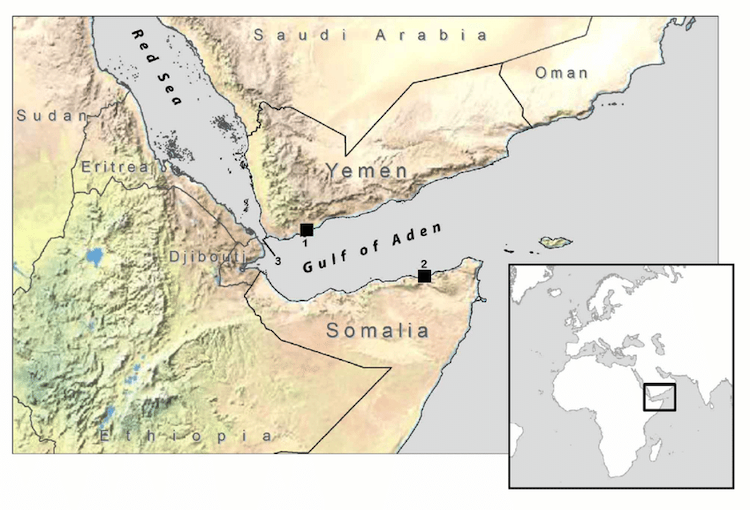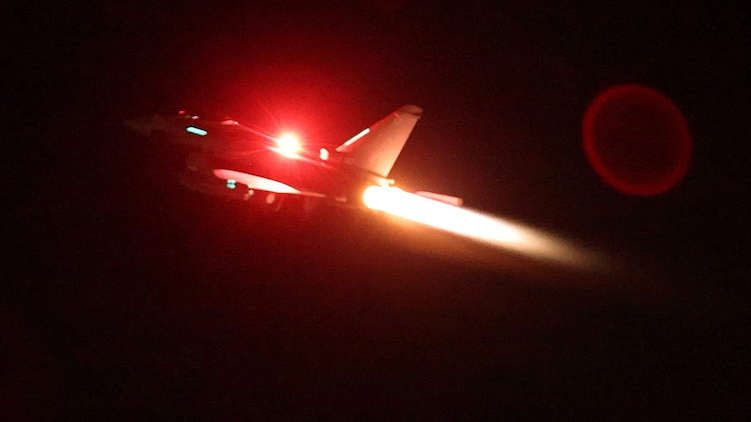Houthi rebels were defiant yesterday after airstrikes by the US and the UK overnight against targets in Yemen, saying they would not go without “punishment or retaliation”.
The militants claimed the 73 strikes – in response to the movement’s attacks on ships in the region – killed five fighters and wounded six others, but said they would continue to block the passage of ships in the Red and Arabian Seas ‘headed to Israel’.
The air and sea strikes against Houthi military targets in Yemen, which have been backed by many Western states, risk turning the Israel-Hamas war in Gaza into a regional conflict.
ALSO SEE: China’s Deflation And Weak Economy Point to Another Bumpy Year
At least four oil tankers diverted course from the Red Sea after the overnight strikes in Yemen, shipping data from LSEG and Kpler showed.
The tankers Toya, Diyyinah-I, Stolt Zulu and Navig8 Pride LHJ were all seen turning around mid-voyage in order to avoid the Red Sea between 0300 and 0730 GMT on Friday, according to ship tracking from the two companies.
One of the tankers, Toya, a very large crude carrier capable of carrying up to 2 million barrels of oil, was unladen, the data showed. The other three vessels are fuel tankers.
Oil rises slightly, dollar and gold edge up
Oil prices were up over $3 a barrel, or more than 4%, by 1115 GMT, with Brent trading above $80, amid heightened geopolitical risks.
Meanwhile, global shares edged up on Friday while slightly hotter US inflation data did not shift investors’ view that interest rates could soon start to fall.
The MSCI All-World share index was up 0.3%, reflecting a bounce in Europe, where the STOXX 600 rose nearly 1%, led partly by a rally in shares of aerospace and defence companies, where the sector index hit a record high.
US stock futures held steady, while government bond yields fell, reflecting demand among investors for safe-haven assets.
“This morning, the oil price has responded in a relatively measured way … and the fixed income market is responding from the perspective that this might well not be so great for growth, but it is not a concern from an inflationary perspective, so there is a slight flight to quality, but not something that is a game-changer,” Daiwa Capital Markets head of economic research Chris Scicluna said.
The dollar edged up against a basket of major currencies, as did gold, which benefitted from investor risk aversion, rising 0.5% to $2,040 an ounce. Other classic safe-havens such as the Swiss franc held mostly steady, a situation that some analysts said could change.
“If we see a massive escalation of the situation … then the traditional flight-to-safety will see US Treasuries, safe-haven currencies like yen and Swiss franc benefit,” Khoon Goh, head of Asia research at ANZ in Singapore, said.

Raids target military sites
Witnesses in Yemen confirmed explosions throughout the country, saying raids targeted a military base adjacent to Sanaa airport, a military site near Taiz airport, a Houthi naval base in Hodeidah and military sites in Hajjah governorate.
“These targeted strikes are a clear message that the United States and our partners will not tolerate attacks on our personnel or allow hostile actors to imperil freedom of navigation,” US President Joe Biden said in a statement.
Britain’s defence ministry said in a statement that “early indications are that the Houthis’ ability to threaten merchant shipping has taken a blow,” James Heappey, a junior defence minister, said the strikes were in self-defence and no further action was planned for now.
The Houthis, an armed movement that took control of most of Yemen over the past decade, have been attacking shipping at the mouth of the Red Sea – one of the world’s busiest trade lanes – since October. The action is in support of Hamas, they say.
The United States and numerous allies have deployed a naval task force in the area to protect ships, and US and British warships had shot down 21 drones and missiles on Tuesday to repel the biggest Houthi attack so far.
Iran, which supports armed groups around the Middle East including both the Houthis and Hamas, condemned the US and British attacks. A Houthi spokesperson said there was no justification for the attacks.
US Defence Secretary Lloyd Austin, who is in hospital due to surgery complications, said in a statement that the strikes targeted Houthi drones, ballistic and cruise missiles, costal radar and air surveillance.
A Houthi official confirmed “raids” in the capital Sanaa along with the cities of Saada and Dhamar as well as in Hodeidah governorate, calling them “American-Zionist-British aggression.”
Russia requested an urgent meeting of the UN Security Council.

Fears of escalation
The Houthi attacks have disrupted international commerce, forcing many container ships to take the long route around southern Africa, which has ramped up costs and delays that have stoked fears of a new bout of global inflation.
The US said Australia, Bahrain, Canada and the Netherlands supported the overnight operation as part of an international effort to restore the free flow of trade.
The route, which links Europe and Asia and Africa via the Suez Canal, accounts for about 15% of the world’s shipping traffic.
The strikes, the first by the United States on Yemeni territory since 2016, were a clear demonstration of Washington’s struggle contain the fallout of the Israel-Hamas war since it broke out in October.
“The concern is that this could escalate,” Andreas Krieg at King’s College in London, said.
Saudi Arabia called for restraint and “avoiding escalation”. The Saudis have backed the opposing side in a war against the Houthis for nearly a decade, which has been in a delicate state of peace negotiations.
The United States also accused Iran of being involved operationally in the Houthi attacks, providing the military capabilities and intelligence to carry them out.
“We believe that they have been certainly involved in every phase of this,” a senior US official told reporters.
Israel has mounted a military assault that has killed more than 23,000 Palestinians in Gaza after Hamas fighters attacked Israel on October 7, killing 1,200 people and seizing 240 hostages.
The three months since have also seen violence escalate in Lebanon and the Israeli-occupied West Bank, as well as in Syria and Iraq, both flashpoints where armed groups backed by Iran operate and the United States has troops on the ground.
Iraq’s state news agency quoted an advisor to its prime minister as saying the West was expanding the conflict. The strikes on Yemen were carried out by aircraft, ship and submarine. A US official said more than a dozen locations were targeted and the strikes were intended to weaken the Houthis’ military capabilities, as opposed to being just symbolic.
“We were going after very specific capability in very specific locations with precision munitions,” a US military official said.
The Houthis have defied a call by the United Nations to halt their missile and drone attacks on Red Sea shipping routes and warnings from the United States of consequences if they failed to do so.
- Reuters with additional input and editing by Jim Pollard
NOTE: This report was updated on January 12, 2024 to note tankers diverting from the Red Sea and the new oil price.
ALSO SEE:
US, UK Warships Knock Out ‘Largest’ Red Sea Drone Attack
Militants Get ‘Final Warning’ After Red Sea Missile Launch – AP
Ocean Freight Fees Shoot up After New Red Sea Ship Attacks
Maersk Halts Red Sea Routes Again After Latest Attack – CNN
























